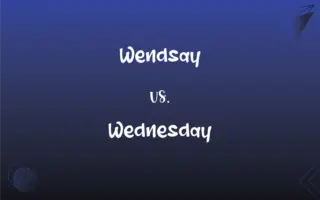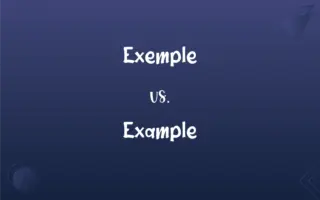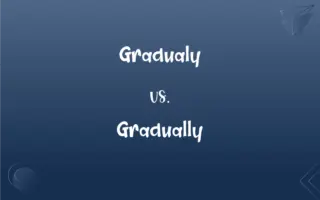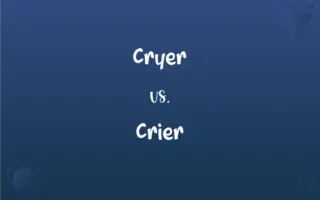Curent vs. Current: Mastering the Correct Spelling
Edited by Aimie Carlson || By Janet White || Updated on March 13, 2024
"Curent" is an incorrect spelling, while "Current" is correct, referring to the flow or present time.

Which is correct: Curent or Current
How to spell Current?

Curent is Incorrect

Current is Correct
ADVERTISEMENT
Key Differences
Remember "uRRent" with emphasis on the double 'R'.
Think of "current" as being "up-to-date," both having two 'r's.
"Current" has two 'r's just like a "river," which flows.
The word "current" has "rent" at the end, reminding us to pay our rent on time (current).
Link "current" to "current events," both of which are commonly used terms.
ADVERTISEMENT
Correct usage of Current
He's not aware of the curent events.
He's not aware of the current events.
Our curent location is not on the map.
Our current location is not on the map.
The curent is too strong to swim in.
The current is too strong to swim in.
What is the curent temperature?
What is the current temperature?
The curent trends in fashion are quite interesting.
The current trends in fashion are quite interesting.
Current Definitions
A flow of water, air, or electricity.
The river has a strong current.
The part of a fluid body moving continuously.
The current of the crowd moved towards the exit.
Belonging to the present time; present-day
Current events.
Current leaders.
My current address.
Being in progress now
Current negotiations.
Commonly accepted or used; prevalent
Current fashions.
Current technology.
Passing from one to another; circulating, as money or a rumor
Current bills and coins.
Running; flowing.
A steady, smooth onward flow or movement
A current of air from a fan.
A current of spoken words.
The part of a body of liquid or gas that has a continuous onward movement
Rowed out into the river's swift current.
A general tendency, movement, or course.
A flow of electric charge.
The amount of electric charge flowing past a specified circuit point per unit time, usually expressed in amperes.
The generally unidirectional movement of a gas or fluid.
The part of a fluid that moves continuously in a certain direction, especially (oceanography) nocap=a.
(electricity) the amount of electric charge flowing in each unit of time.
A tendency or a course of events
Existing or occurring at the moment.
Current events
Current leaders
Current negotiations
Generally accepted, used, practiced, or prevalent at the moment.
Current affairs
Current bills and coins
Current fashions
(India) Electric; of or relating to electricity.
Current bill
Current shock
(obsolete) Running or moving rapidly.
Running or moving rapidly.
Like the current fire, that rennethUpon a cord.
To chase a creature that was current thenIn these wild woods, the hart with golden horns.
Now passing, as time; as, the current month.
Passing from person to person, or from hand to hand; circulating through the community; generally received; common; as, a current coin; a current report; current history.
That there was current money in Abraham's time is past doubt.
Your fire-new stamp of honor is scarce current.
His current value, which is less or more as men have occasion for him.
Commonly estimated or acknowledged.
Fitted for general acceptance or circulation; authentic; passable.
O Buckingham, now do I play the touchTo try if thou be current gold indeed.
A flowing or passing; onward motion. Hence: A body of fluid moving continuously in a certain direction; a stream; esp., the swiftest part of it; as, a current of water or of air; that which resembles a stream in motion; as, a current of electricity.
Two such silver currents, when they join,Do glorify the banks that bound them in.
The surface of the ocean is furrowed by currents, whose direction . . . the navigator should know.
General course; ordinary procedure; progressive and connected movement; as, the current of time, of events, of opinion, etc.
A flow of electricity through a conductor;
The current was measured in amperes
A steady flow (usually from natural causes);
The raft floated downstream on the current
He felt a stream of air
Dominant course (suggestive of running water) of successive events or ideas;
Two streams of development run through American history
Stream of consciousness
The flow of thought
The current of history
Occurring in or belonging to the present time;
Current events
The current topic
Current negotiations
Current psychoanalytic theories
The ship's current position
Pertaining to the present time.
She read the current news of the day.
Commonly accepted, used, or practiced.
It's the current trend in fashion.
Flowing smoothly and steadily.
Keep the conversation current without deviating.
Current Sentences
The river's current can be dangerous for swimmers.
I always try to stay informed about current news.
She is studying the effects of ocean currents on climate change.
The current version of the software has many improvements.
The current situation requires immediate attention.
He is the current champion of the chess tournament.
Please, update me on the current status of the project.
Their current strategy seems to be working very well.
Understanding the current market conditions is essential for investors.
Make sure you're using the current edition of the textbook.
The exhibit showcases current trends in art.
The current topic of discussion is climate action.
The electrical current in this wire is surprisingly strong.
We are working to address current issues in our community.
The report highlights the current challenges facing the industry.
Current Idioms & Phrases
Go with the current
To follow the prevailing trend or tendency.
Sometimes it's easier to just go with the current than to resist.
In the current climate
Referring to the present general atmosphere or situation.
In the current climate, it's important to be aware of environmental issues.
Current of thought
The dominant trend in public opinion or belief.
The current of thought seems to be shifting towards sustainability and green living.
Against the current
To go against the prevailing trend or opinion.
It takes courage to swim against the current and stand up for what you believe in.
Current affairs
Events of political or social interest and importance happening in the world at the present time.
He likes to stay up-to-date on current affairs by reading the news every morning.
Current events class
A class or course focusing on recent events happening in the world.
The current events class discussed the impact of recent elections on international relations.
Up to the current
Being informed about the latest developments or trends.
As a journalist, it's her job to stay up to the current.
Make current
To bring something up to date or make it contemporary.
The museum's new exhibit makes current the historical events of the past century.
The current of the times
The general direction in which society or events are moving.
You can see the influence of the current of the times in the latest movies and literature.
Caught in the current
Being swept away by or involved in the dominant trend or movement.
It's easy to get caught in the current of consumerism if you're not careful.
FAQs
What is the verb form of Current?
"Current" doesn't have a direct verb form; however, "to flow" or "to circulate" can be related actions.
What is the root word of Current?
The root word is "currere" from Latin, meaning "to run."
What is the pronunciation of Current?
Pronounced as "KUR-ent."
What is the singular form of Current?
The singular form is "current."
What is the plural form of Current?
The word "current" doesn't typically have a plural form, but contexts like "currents" can refer to multiple flows.
Why is it called Current?
It's derived from Latin "currere" meaning "to run," reflecting the flow or movement.
Which vowel is used before Current?
The vowel "u" is used.
Is Current an adverb?
No, "current" is not an adverb.
Is Current a countable noun?
Not in general. But in contexts like "ocean currents," it can be.
Which preposition is used with Current?
"In" or "of" can be used, as in "current of air" or "in the current situation."
Is Current a noun or adjective?
"Current" can be both a noun and an adjective.
Is the word Current is imperative?
No, "current" is not an imperative verb.
How do we divide Current into syllables?
Cur-rent.
What is a stressed syllable in Current?
The first syllable, "Cur."
What is the second form of Current?
"Current" doesn't have verb forms.
What is the third form of Current?
"Current" doesn't have verb forms.
Which conjunction is used with Current?
Conjunctions like "and" or "but" can be used, depending on the sentence.
Is Current an abstract noun?
Not typically, as it can represent tangible flows or the concept of "now."
Is Current a vowel or consonant?
"Current" is a word, not a single letter. It contains both vowels and consonants.
Is Current a collective noun?
No, "current" is not a collective noun.
Is the Current term a metaphor?
It can be used metaphorically, e.g., "current of emotions."
How many syllables are in Current?
There are two syllables.
What is another term for Current?
"Flow" or "stream" for the noun; "present" or "modern" for the adjective.
What is the first form of Current?
"Current" is the base form.
Which article is used with Current?
Both "a" and "the" can be used, depending on context.
Is Current a negative or positive word?
Neutral; it depends on the context.
How is Current used in a sentence?
"The current trend in fashion is leaning towards sustainability."
What part of speech is Current?
"Current" can be a noun or an adjective.
What is the opposite of Current?
"Stagnant" or "past."
Which determiner is used with Current?
Determiners like "the," "this," or "that" can be used.
About Author
Written by
Janet WhiteJanet White has been an esteemed writer and blogger for Difference Wiki. Holding a Master's degree in Science and Medical Journalism from the prestigious Boston University, she has consistently demonstrated her expertise and passion for her field. When she's not immersed in her work, Janet relishes her time exercising, delving into a good book, and cherishing moments with friends and family.
Edited by
Aimie CarlsonAimie Carlson, holding a master's degree in English literature, is a fervent English language enthusiast. She lends her writing talents to Difference Wiki, a prominent website that specializes in comparisons, offering readers insightful analyses that both captivate and inform.


































































